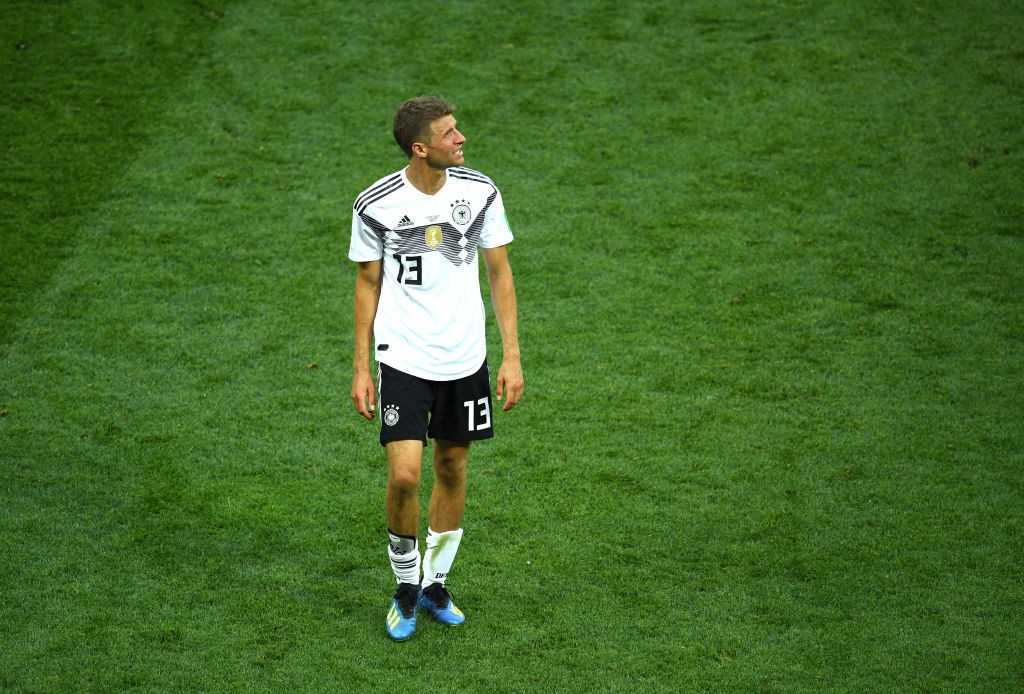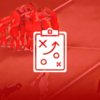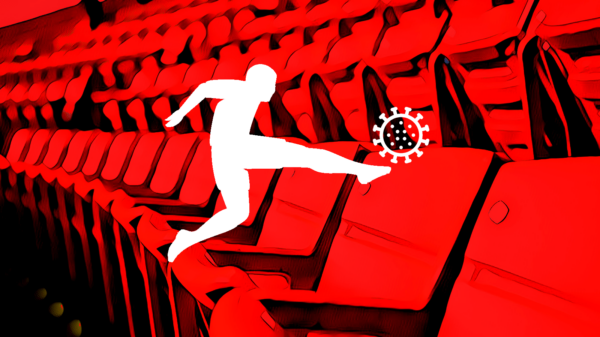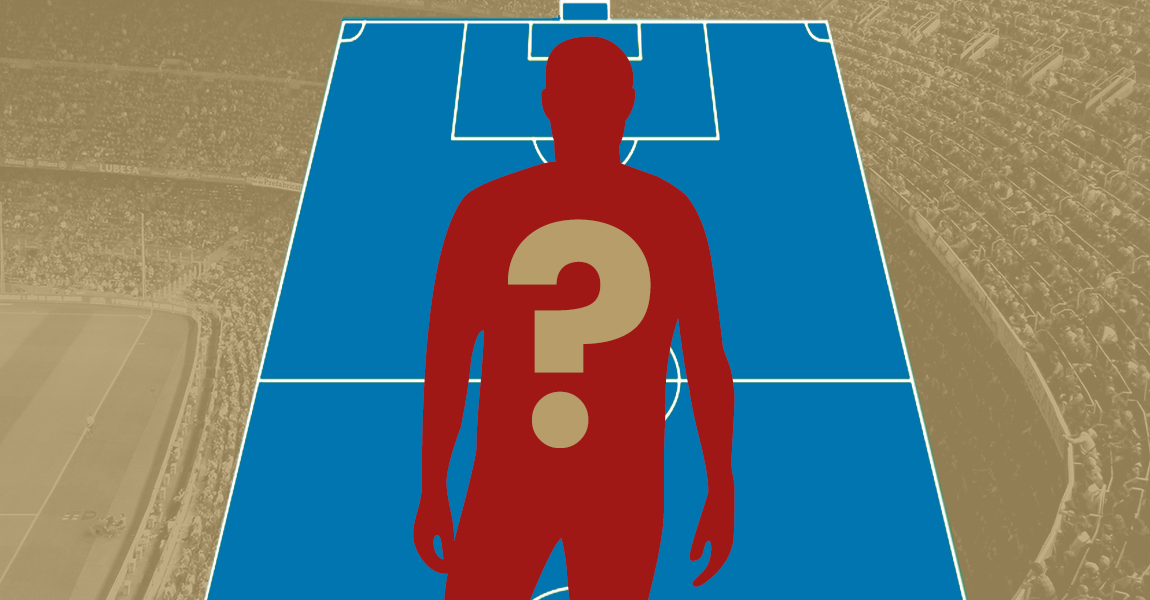
Andrew Thompson has some words of caution for Germany following their shock defeat to Mexico in their World Cup 2018 opener.
The beauty of the World Cup is that you can always expect the unexpected. In a tournament and in a sport where shock results are commonplace, the latest summer installment of the beautiful game has come good in a big way.
Heads turned when Egypt nearly held a dark horse Uruguay scoreless, while just hours later Iran shocked a young and talented Moroccan side. France would struggle against an Australian opponent that many assumed would roll over by half time, Messi’s Argentina were valiantly matched by an Iceland side that continues to gain footballing recognition, and Peru were spirited in a performance worthy of more than its result. But on a day where Swiss precision matched Brazilian flair, the biggest upset of the tournament thus far unfolded at Moscow’s Luzhniki Stadium.
In one of the bigger shocks of recent World Cup group stage play, tournament favorite and current holders Germany succumbed to defeat at the hands of CONCACAF frontrunner Mexico. It was an uncharacteristically tepid performance by the four-time winners, though nothing can be taken away from how brilliant El Tri were on the day. But despite how good Mexico truly were, this was a result that could have easily been avoided. Germany were their own worst enemy.
It was a chapter we have all read before; Diego Maradona and Argentina fell to Cameroon 1-0 in 1990 as holders, Senegal’s famous 1-0 win over France in 2002 after their hometown heroics in 1998, and Spain being thrashed 5-1 against rampant Dutch opposition in 2014. Other title defenses have started with draws; Italy (2010), the former West Germany (1978), and Brazil (1974) to be precise. History often repeats itself in many forms, and this is yet another one that can be catalogued.
The warning signs popped up long before events unfolded in the Russian capital, however. Despite Germany walking their qualifying group to the tune of forty-three goals and just four surrendered – while only being held to less than three goals in two of their ten matches – it was the Euro 2016 semi-final against France that should have been referenced.
Die Mannschaft put in a typical performance against Les Blues at the Stade Vélodrome that evening; 65% possession and seventeen attempts are what everyone expected, but Joachim Löw’s troops fell 2-0 on the back of an Antoine Griezmann brace. Germany lacked real conviction, urgency, and only managed to send France into panic a handful of times. The French defense held firm, kept their shape, and looked to hit their opponent on the break where their attacking qualities would come alive. Sound familiar?
A blueprint showing how to counter the Germans was laid two years ago on the shores of the Mediterranean. Juan Carlos Osorio did well to read it, while Löw remained stubborn in his operational preference. Osorio reaped the benefits.
As expected, in so many matches before, Germany controlled proceedings; 66% possession, twice the number of attempts (26) including hitting the woodwork late-on through substitute Julian Brandt. It would not be enough. Young talismanic winger Hirving Lozano, coming off a brilliant campaign at PSV Eindhoven, would prove the difference. In truth, Mexico could have had two or three. The stat columns would fall in Germany’s favor, but they would flatter to deceive in much the same way as they did two years prior.
Though it is early doors in the tournament, and there are ample opportunities for Germany to come good under the weight of expectation, changes should be considered, and glaring weaknesses must be addressed.
“What an incredible disappointment yesterday. No pressing, no stability. The gaps were so big that you are almost scared. Especially between the central defenders and the midfielders. Everything a German team has always been was nonexistent. Nothing.” – Lothar Matthäus
Perhaps succinctly summed up by Germany’s all-time leader in appearances, but Matthäus touched on uncharacteristic structural and defensive deficiencies that were their ultimate undoing.
When I wrote pre-tournament that a key for German success in Russia this summer was the right-sided partnership of Thomas Müller and Joshua Kimmich, I was not suggesting that it should divulge into almost the entirety of the match being played out on the right-half of the pitch. In a bid to maximize Müller’s renowned movement and spatial awareness, while relying on Kimmich to provide much of the width Germany craved, the right side was largely overloaded for much of the proceedings.

It wasn’t just the Bayern duo that would operate in that channel, with Sami Khedira, Jerome Boateng, Mesut Özil, and Timo Werner all routinely drifting into the same spaces. What took place was an absolute attacking nightmare, where any semblance of space to operate or room to drag Mexican defenders out of their shape could not be found. Though Werner tried to be a bit more mobile in a bid to find space to utilize his blistering pace, Germany failed to do enough to supply the RB Leipzig front-man.
While much of the blame can fall on the team’s tactical shortcomings, equal – if not more – praise can be heaped on Mexico. Héctor Herrera and Andrés Guardado were sublime in midfield, Jesús Gallardo patrolled the left side of the pitch with expertise, and the collective unit in the defensive third remained organized and well-marshaled. It was all too easy for Mexico overall, and not just because of the right-sided overload.
Possession and control of a match is the ideal scenario for many top sides in world football, but it’s what you do with that possession that matters. Playing out of the back and into the middle third of the park was easy, but It was the transition from the middle third into the final third where Germany struggled; and it was their own doing.
An inability to show attacking intent at a higher pace allowed Mexico to track back and reestablish their shape in good order before the world champions could mount a serious assault on their lines. A higher tempo was desperately needed rather than forced possession through the likes of Özil and Toni Kroos, both of whom were two of the better performers on the day, but who also were the biggest proponents of overcomplicating the build-up phase in play. Some of that was down to a severe lack of movement from Germany’s forward players, but most can be traced back to the insistence of using the right channel. Both Julian Draxler and Marvin Plattenhardt, capable of providing service, were starved of sufficient chances to genuinely put their stamp on the match. Substitutes Mario Gomez, Marco Reus, and Julian Brandt exhibited positive changes, but bar Brandt’s unlucky effort, the problems persisted until the final whistle.
It’s good to get a shot across the bows, but now we have to go out and win the next two games. Mexico deserved to win because we made it too easy for them and they countered us ruthlessly. I fully expect us to show a different side against Sweden and South Korea. We have to win two games now.” – Mats Hümmels
Though they were held scoreless by Mexico, there were some signs of life going forward. Out of the twenty-six shot attempts registered, nine were on frame (seven came from outside the area), one hit the crossbar, and nine were blocked (five of which were inside the area). The amount of higher percentage chances may have not reached expected levels, but chances were still created. It is harder to find a parachute when discussing the defense.
If Germany is to get back on track against what could be two tricky opponents, the poor organization, lack of positional awareness without possession, and failure to meet defensive responsibilities must be addressed above all things.
Mexico managed to craft thirteen attempts out of just 34% possession, with a third of those coming directly off the counter without the need to stop and build up play. The North American-side squandered a handful of chances that could have put them up by more than a single goal, but Osorio identified Germany’s weakness from early on and reaped the rewards despite this.
Deploying the central pivot of Kroos and Khedira, Germany lacked proper cover for Hümmels and Boateng in the form of a defensive minded midfielder. Khedira, a box-to-box player by trade, failed to track back on several occasions after routinely going forward to aid efforts up the pitch. Coupled with Kimmich being the main provider of width down the right, Boateng pushing forward and abandoning his line with Hümmels, and a midfield partner in Kroos who spent much of his time in the opposition third (which is expected), Manuel Neuer could count on only Hümmels to regularly be on station in the defensive third of the pitch. Such were the issues in midfield and defense that even Özil tracked back far more than usual in a bid to relieve the situation. Any semblance of structure at the back and in midfield was lacking, and Mexico exploited it time and again, just as France did in Marseilles.
“Losing the opener is unfamiliar territory for us. There’s still a long way to go. I’m convinced that we’ll show a reaction. The mindset was right, but we didn’t get into the game properly and were then on the back foot. We need to start playing to our strengths again. We have to try to get more shots off, then we won’t run into as many problems.” – Joachim Löw
It may not be crisis meltdown in the Germany camp, but there is still cause for concern. Another lackluster performance could see them out of the competition before the group stage has been completed. The question now is whether the Schönau-born headmaster will keep faith in the same eleven – and likely the same approach – or ring in changes. It is unlikely that his faith will most of the players will have waivered considering one poor performance, but the World Cup is a results business if there ever was one, and a few tweaks to the team may be viewed as the better part of prudence.
Highly touted he may be – and rightly so – but Timo Werner is not suited to a system rooted in possession and control; he’s far more ruthless and effective in a direct approach where space behind the defense can be found. In this sense, Mario Gomez may once again be called into the team to give Germany an attacking focal point.
Another attacking change which may deserve consideration is the utilization of Marco Reus on the left flank in place of Julian Draxler. Though the former Schalke youth graduate had a somewhat decent outing, he does have an affinity for tucking into the central channel. Reus can and does do the same, but his additional pace and ability to stay wide to stretch the defense – a trait we’ve seen often at Borussia Dortmund – may serve Germany well if it is to avoid traffic control problems going forward, though staying with Draxler would not be out of place either.
In midfield, Khedira showed signs that he no longer may be able to perform the role which he is best suited. If Germany is to impose their will in the final third and push numbers forward, a midfielder who is willing to sit deeper behind Kroos and provide a link between the back four and midfield is far more sensible. Some have called for Sebastian Rudy to come into the team and occupy that role, one that he has done with distinction over the course of his club career, particularly during his Hoffenheim days.
As for the defense, Boateng, like Khedira, has shown some signs of regression, particularly from a physical standpoint. His recovery pace did not come into the picture against Mexico, which exacerbated the issue of him pushing too far forward too often and leaving the defense exposed further. Perhaps it is due to his injury record this past season at club level, but Boateng put in one of his least effective performances of his national team career against Mexico.
If he is to face the ax – which does seem unlikely – then it stands to reason that Niklas Süle be his replacement. No Bayern defender made more overall appearances in 2017/18 than the former Hoffenheim stalwart, and he’s already forged chemistry on the pitch with Hümmels and Neuer, making it a far less risky change to the defensive dynamic than calling on Antonio Rüdiger or Matthias Ginter.
Whatever changes – if any – that are made, Germany can fall back on the knowledge that their squad depth is one of the best in the tournament. Beyond personnel changes, Jogi Löw must press upon the team to break the opposition down faster, keeping them off-guard and out of shape as much as possible while making sure their own structure is not compromised.
There is a chance to yet again add another chapter to their story in the annals of football history this summer. Becoming the first side to repeat as champion since 1962 would be a magnificent achievement, but another more ominous achievement looms on the horizon. Failure to secure three points against a Sweden side capable of grinding out results with their backs against the wall would see them going into the final day of group stage play unable to hold the keys to their own destiny.
Germany must heed the warning signs that reared its ugly head in the flood meadows of the Moskva if they are to avoid the same fate as France, Italy, and Spain before them.
- 20 Key Young Players to Watch from 20 Premier League Teams - August 10, 2018
- World Cup 2018: Germany Warning Signs - June 20, 2018
- MLS 2017: Top 5 U-22 Players of the Season - December 6, 2017

























































